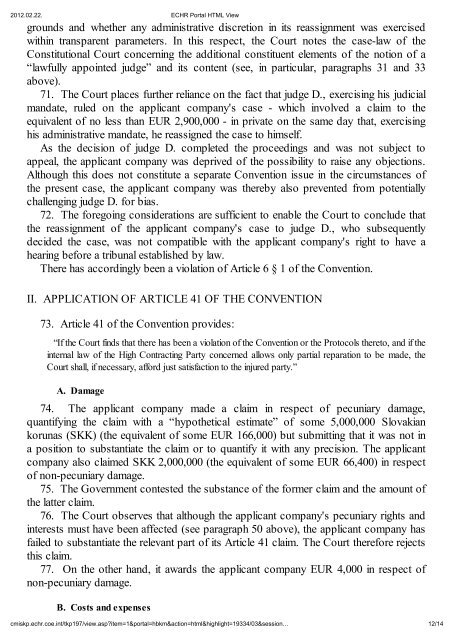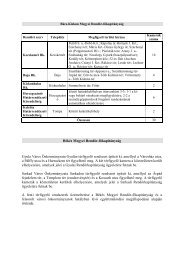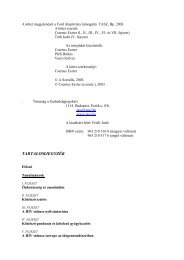FOURTH SECTION CASE OF DMD GROUP, AS v. SLOVAKIA - TASZ
FOURTH SECTION CASE OF DMD GROUP, AS v. SLOVAKIA - TASZ
FOURTH SECTION CASE OF DMD GROUP, AS v. SLOVAKIA - TASZ
You also want an ePaper? Increase the reach of your titles
YUMPU automatically turns print PDFs into web optimized ePapers that Google loves.
2012.02.22. ECHR Portal HTML View<br />
grounds and whether any administrative discretion in its reassignment was exercised<br />
within transparent parameters. In this respect, the Court notes the case-law of the<br />
Constitutional Court concerning the additional constituent elements of the notion of a<br />
“lawfully appointed judge” and its content (see, in particular, paragraphs 31 and 33<br />
above).<br />
71. The Court places further reliance on the fact that judge D., exercising his judicial<br />
mandate, ruled on the applicant company's case - which involved a claim to the<br />
equivalent of no less than EUR 2,900,000 - in private on the same day that, exercising<br />
his administrative mandate, he reassigned the case to himself.<br />
As the decision of judge D. completed the proceedings and was not subject to<br />
appeal, the applicant company was deprived of the possibility to raise any objections.<br />
Although this does not constitute a separate Convention issue in the circumstances of<br />
the present case, the applicant company was thereby also prevented from potentially<br />
challenging judge D. for bias.<br />
72. The foregoing considerations are sufficient to enable the Court to conclude that<br />
the reassignment of the applicant company's case to judge D., who subsequently<br />
decided the case, was not compatible with the applicant company's right to have a<br />
hearing before a tribunal established by law.<br />
There has accordingly been a violation of Article 6 § 1 of the Convention.<br />
II. APPLICATION <strong>OF</strong> ARTICLE 41 <strong>OF</strong> THE CONVENTION<br />
73. Article 41 of the Convention provides:<br />
“If the Court finds that there has been a violation of the Convention or the Protocols thereto, and if the<br />
internal law of the High Contracting Party concerned allows only partial reparation to be made, the<br />
Court shall, if necessary, afford just satisfaction to the injured party.”<br />
A. Damage<br />
74. The applicant company made a claim in respect of pecuniary damage,<br />
quantifying the claim with a “hypothetical estimate” of some 5,000,000 Slovakian<br />
korunas (SKK) (the equivalent of some EUR 166,000) but submitting that it was not in<br />
a position to substantiate the claim or to quantify it with any precision. The applicant<br />
company also claimed SKK 2,000,000 (the equivalent of some EUR 66,400) in respect<br />
of non-pecuniary damage.<br />
75. The Government contested the substance of the former claim and the amount of<br />
the latter claim.<br />
76. The Court observes that although the applicant company's pecuniary rights and<br />
interests must have been affected (see paragraph 50 above), the applicant company has<br />
failed to substantiate the relevant part of its Article 41 claim. The Court therefore rejects<br />
this claim.<br />
77. On the other hand, it awards the applicant company EUR 4,000 in respect of<br />
non-pecuniary damage.<br />
B. Costs and expenses<br />
cmiskp.echr.coe.int/tkp197/view.asp?item=1&portal=hbkm&action=html&highlight=19334/03&session…<br />
12/14







